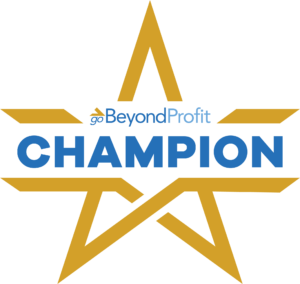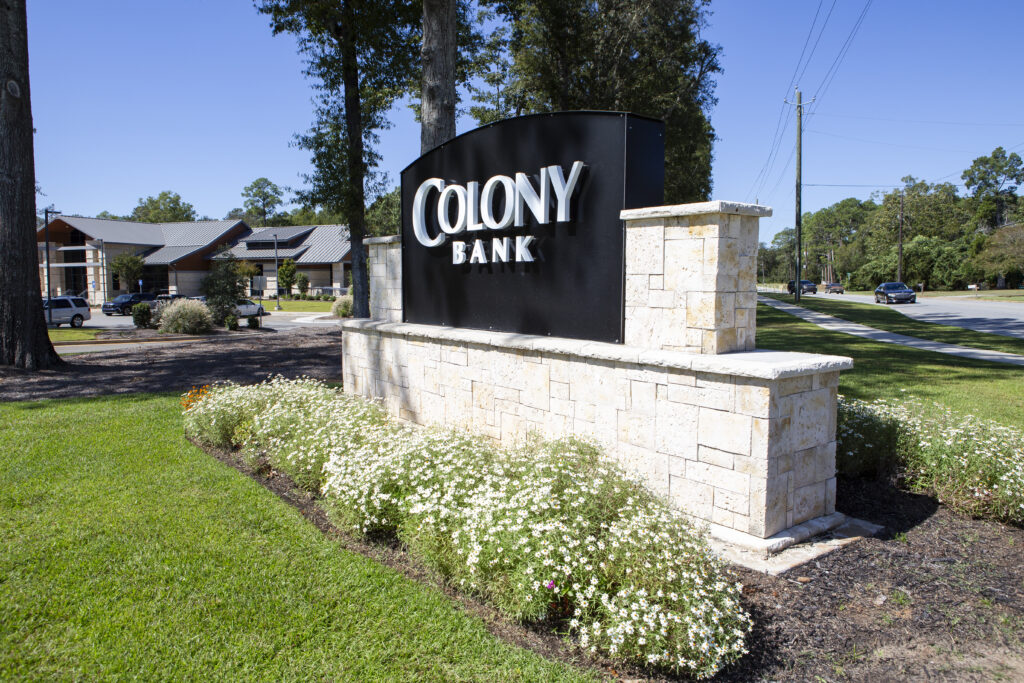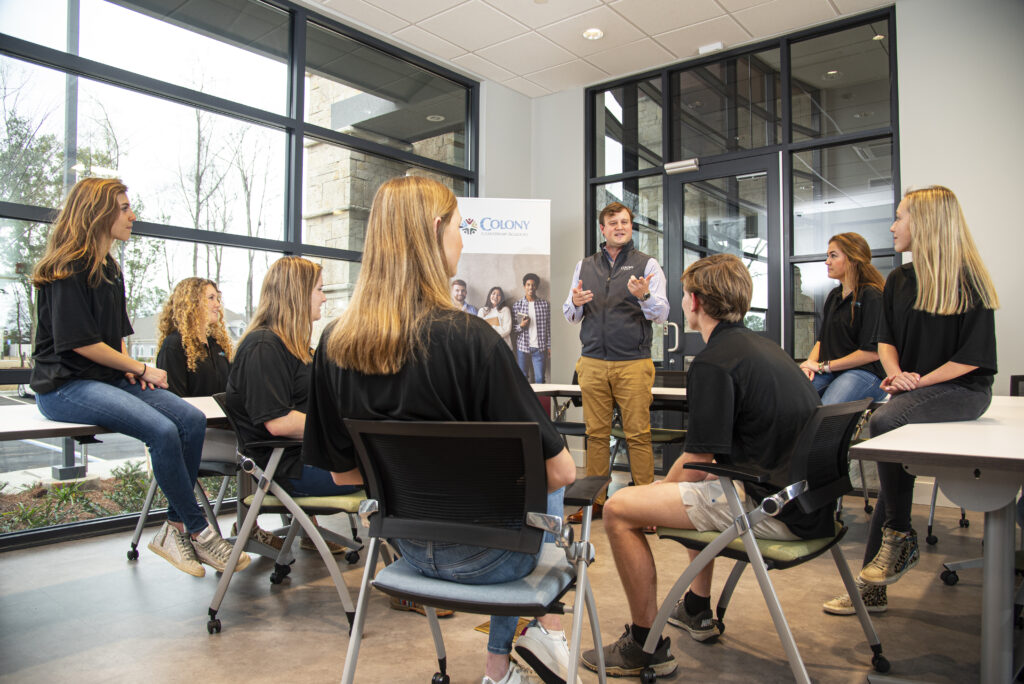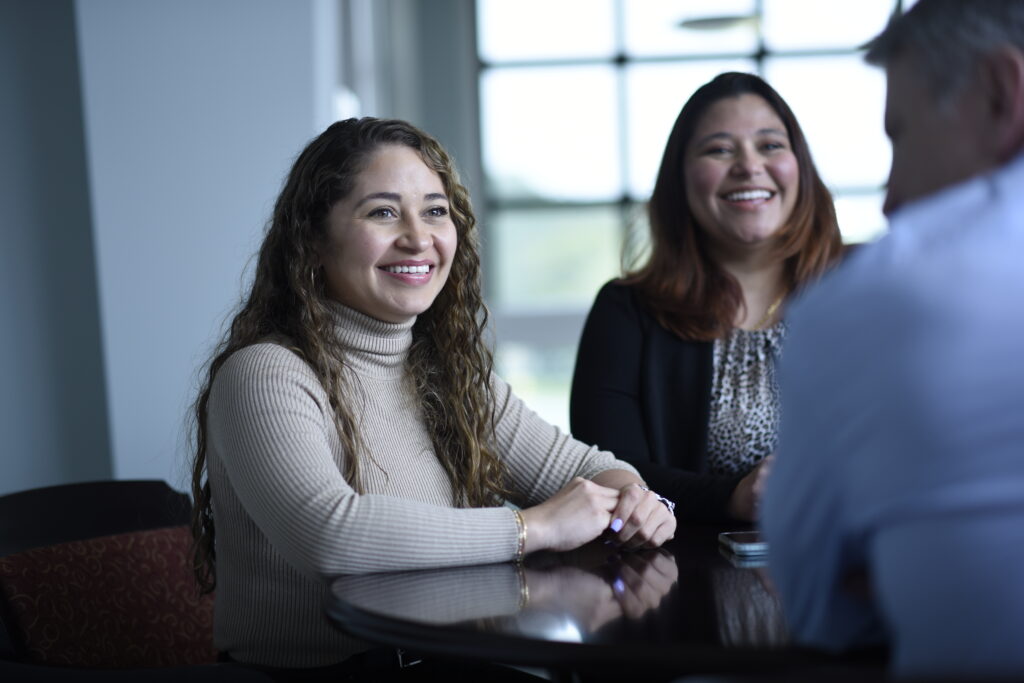Beyond the Bottom Line
Some industries easily adopt a purpose beyond profit. They find that resonate message about ‘moving our world forward’ or simply “refresh the world” that quickly, easily connects customers and employees to a greater good. For others, such as the financial industry, articulating their positive role in people’s lives has been more challenging. In the wake of the financial crisis and recent bank closures, few businesses in this space successfully convey their larger purpose beyond the bottom line.
In our latest CEO interview with Colony Bank CEO, Heath Fountain, he clearly articulates not only the role that community banks play in improving lives but also offers practical ways to tie daily tasks and customer interactions back to the company purpose.
Colony Bank and its CEO Heath Fountain were nominated and selected by fellow Georgia business leaders as a goBeyondProfit Champion for their commitment to serving local communities. Founded in 1975, Colony Bank has grown to nearly 40 offices throughout Georgia, 500 team member, $3 billion in assets, and maintained their commitment as a community bank to those they serve.

More Than Just a Paycheck
I think you’ve seen people really wanting more out of life. What is this all about? The pandemic gave time for people to really do some soul-searching, and I think that’s another reason why it’s important for us to give back and to make sure we’re about something more than just profit and we’re about something more than the bottom line.
It’s an important selling point for us when we’re engaging with prospective team members; we’re telling them that their job is more than just a paycheck and more than just us achieving certain goals.
As a bank, we’re really important to people’s lives, we’re the grease that keeps the economy moving. We insert ourselves into the lives of our customers. And so we need to be sure we’re explaining to our team members how important that is and what our customers are able to achieve because we’re able to understand what their goals are and help fulfill a need they have for capital or payments, whatever it may be to achieve a goal.
As an industry we haven’t done a great job of helping connect people back to this larger purpose, It’s more important to the younger generation than my generation and generations before me. They want to be a part of something bigger, and we really offer that in community banking and here at Colony.
Understanding Leads to Meaningful Investment
“We don’t want to just write a check and walk away” says Heath Fountain. “We want to be investing in the things that our team members support, that our customers support. Really, a lot of our communities depend on community banks like us and others to really support organizations in their community. The foundation of the community banking system is about giving back and it’s certainly what we try to do here at Colony Bank.”
Colony Bank Financial Literary Program
We see situations everyday where customers just didn’t understand and didn’t have a good foundation in financial literacy, and they got themselves in a bad financial situation. It’s a real problem in this country. It’s a real problem in the state. And it’s probably a bigger problem in rural communities than it is maybe in larger communities.
Financial literacy is not taught well in schools. It’s not taught in the home a lot. And so, we saw this big void that needed filling. We feel like that’s a real purpose for us because we’re in the finance business. We want to help people in that area in any way we can.
That’s why we partnered with the Dave Ramsey Organization to provide financial literacy. I think we’re in about 24 schools right now. We’ve done this for a few years, and we’ve impacted over 5,000 students. Our goal really is to give them a foundation in basic personal finance before they get themselves in a situation to do damage.

The earlier you start, the better, because these students are going off to college, they’re going to start getting job offers, they’re going to get greater freedom, and we want to make sure that they have a good foundation and can make good, solid financial decisions.
Financial literacy will benefit them the rest of their life and if they don’t get it, it could hinder them for the rest of their lives.
Colony Bank Leadership Academy
Colony Leadership Academy is a youth leadership program for high school juniors and seniors. We take about 40-50 students each year and we put them through a year-long leadership program that consists of four weekends where they hear about what’s going on in business, industry, healthcare, tourism, agriculture, military.
We partner with the UGA’s Fanning Institute of Leadership Development and provide leadership training. They’re learning about different industries. They’re learning about career opportunities. They’re getting to meet other youth from across the state. It’s really a phenomenal program.
You often hear people say, “Oh, what’s the future going to be? The young people today.” But I’ll tell you, I’ve spent some time with them and if the youth in this country are like these young people, the future’s really bright.

Investing in Rural Hospitals and Schools
What I really like about programs like Georgia HEART and Georgia GOAL is they take potential tax dollars and instead of filtering them through our state government they direct resources right to where they can be best used. In particular, the Georgia HEART program is for rural hospitals. Healthcare delivery is a challenge everywhere but especially in our rural communities.
In rural communities you’ve seen investment pull back, so this is an opportunity for us to really help where most of our team members live and where most of our customers live. We try to give back to the participating hospitals throughout our footprint so that they can have some direct investment in things that they can do that will help healthcare delivery in their communities.
I’ve also seen the impact that the money from the GOAL Scholarship has had on the schools here in Albany, Georgia, and I know from talking to others the similar impacts in schools across Georgia. It’s really providing scholarship opportunities for people that would not have the opportunity to attend a college preparatory school.
So, this is a really great opportunity for Colony Bank. Through these two programs, we support schools and hospitals throughout our footprint which benefits our customers and our team members.
Implementing Intentional Leadership Across a Dispersed Workforce
I feel like it’s important to be able to describe our culture down to a single page. We have a document we call the Colony Manifesto. It walks a team member, a customer, or a prospective team member through what we’re about at Colony, why we’re here, what we’re trying to achieve as an organization, how we behave collectively, what our culture is all about.
We also communicate our financial goals through that document. We communicate our strategic priorities each quarter. What are the three most important things for the quarter? And then we follow up next quarter. How did we do on those three strategic priorities? And what are our big three for the following quarter?
It’s really an important part of our culture, our communication, to talk to our team about what we’re doing and who we are as a company.
On that document, we also talk about how we support the communities that we serve. We talk about why financial literacy is important, how we give employment opportunities through our associate program, through our internship program. We talk about Colony Leadership Academy and the giving of our financial resources.

The Colony Manifesto is a thorough one-page front and back of who we are at Colony. I found that to be really useful to try to give somebody a head start on how we do things at Colony.
On daily basis, we implement cascading communication throughout the organization. It’s really important to us. You must be really focused on it and really think about your constituents and think about how you spread information across the company. You’ve got to do it in multiple ways. I’m known to say that somebody’s got to hear something eight times before they really hear it. And I’ve been told that I used to say it was seven times and I upped it. I don’t know. But you really had to be intentional.
We communicate in multiple ways, like emails, video, newsletters. We try to get two-way communication so we have quarterly forums where our team members can anonymously ask any question they want, and we’ll answer.
I always tell our team when I end a meeting, if there’s anything I can do to better serve them, please let me know. And some do. They tell me, “Hey, I think we’re not living up to what we should do.”
It’s hard, but it’s something you must do. You can’t ever stop. We’re very methodical about it, making sure that we really are thinking about who we’re communicating with and delivering the message in as many ways as we can.
When your team members feel engaged, when they understand not just that they’re told to do something, but why they’re doing what they’re being asked to do, I think they’re happier, they understand, they communicate better with our customers when they understand why they’re communicating a certain message with our customers.
Weathering a Banking Crisis
I had been through the 2008 to 2012 banking crisis where we had a lot of bank closures in Georgia. This most recent crisis happened really quick.
There’s just a lot of education that must be done about the financial industry and how our banking system works. I think back to our discussion on financial literacy. I told the team that my seventh-grade Economics teacher, Ms. Morrow, taught me that the bank didn’t have my money back in the vault for every dollar I had in the bank.
We have great relationships with our customers We just worked really hard, trying to be proactive, to get in front of it. If customers weren’t covered by the FDIC insurance limits, we would make sure they got covered. Our team did an awesome job of just calming nerves when people were a little unsure.
Zero customers came in and took their money out of the bank. We may have had a few that came in thinking that that’s what they want to do, but our team did a great job of just leveraging those relationships and making sure that those customers knew that everything was going to be okay.
Vision for the Future
What we want to do is be the best we can. We don’t say we want to get to a certain size, but we want to keep doing a better job of serving our communities, serving our customers, creating a return for our shareholders, really all our stakeholders. If we can just keep getting better, then we can keep doing it.
Where that takes us, I don’t know, but I think we’ll be serving more communities, we’ll be serving more customers, and we’ll have more team members five years from now than we do today.
